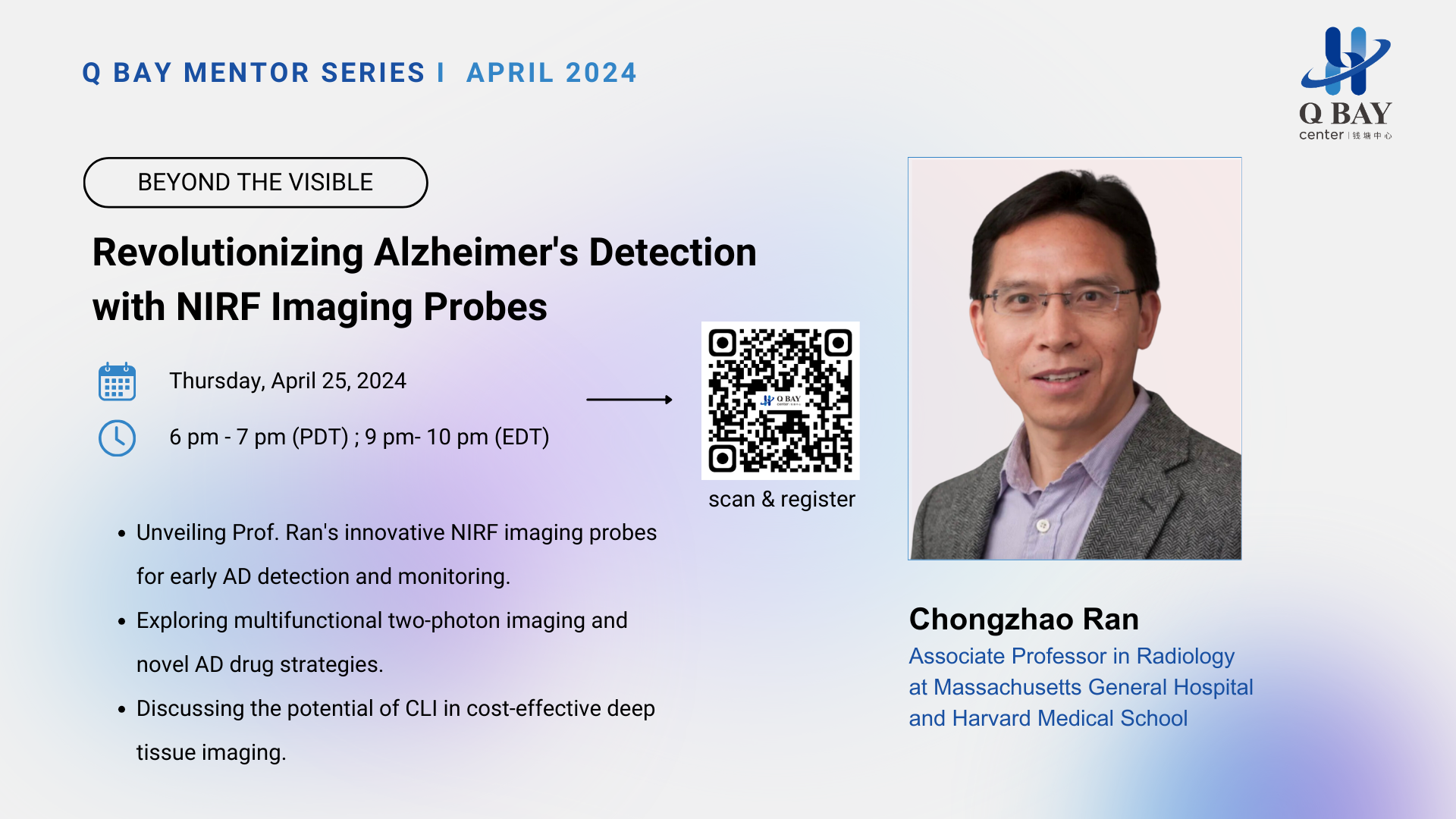Welcome to Q Bay Mentor Series of April! This time we invited Dr. Chongzhao Ran, the Associate Professor in Radiology at Massachusetts General Hospital and Harvard Medical School, to share his innovative research findings on early detection and monitoring of Alzheimer’s disease on Thursday, April 25th at 6:00 PM (PDT) to learn more.
Topics
Alzheimer’s Disease (AD) presents a global challenge, with early detection and monitoring critical for effective intervention. Professor Chongzhao Ran, an esteemed figure at Harvard Medical School and the Athinoula A. Martinos Center for Biomedical Imaging, has made groundbreaking strides in this area through the development of innovative Near-Infrared Fluorescence (NIRF) imaging probes.
His research, focusing on the CRANAD-X series, has introduced a new paradigm in visualizing both soluble and insoluble amyloid beta (Aβ) species, offering a comprehensive view of amyloidosis in AD. This talk will explore Prof. Ran’s journey in creating these “smart” NIRF probes, highlighting their significance in the early detection of AD and the potential for monitoring disease progression.
Additionally, insights into multifunctional two-photon imaging probes for Aβ plaques, novel AD drug development strategies, and the application of Cerenkov Luminescence Imaging (CLI) for cost-effective deep tissue imaging will be discussed. Join us for an engaging session that sheds light on innovative technologies shaping the future of Alzheimer’s research and management.
Event Info
Date: Thursday, April 25th
Time: 6:00 pm – 7:00 pm, PDT
Venue: Zoom for All participants
Speaker Introduction
Chongzhao Ran, PhD, is an Associate Professor in Radiology at Massachusetts General Hospital and Harvard Medical School. He received a Master’s degree in medicinal chemistry from China Pharmaceutical University and a PhD in medicinal chemistry from Shanghai Institute of Pharmaceutical Industry, China. He did his postdoctoral training at the University of Chicago and Harvard Medical School.
Dr. Ran’s research focuses on the development of molecular imaging probe and imaging technologies. He has published nearly 60 papers in the fields of chemistry and molecular imaging, some in high-ranking journals such as PNAS and J. Amer. Chem. Soc. Since 2010, his research has been continuously supported by multiple NIH grants from NIA, NIDDK and other foundations.
In recent years, his research group has successfully developed numerous near-infrared fluorescence (NIRF) imaging probes, which revolve around their own brand CRANAD-X, for in vivo detection of amyloid beta in mouse models of Alzheimer’s disease (AD). Particularly, his research has been focusing on seeking “smart” NIR probes for soluble amyloid beta species, which are widely believed to be the most neurotoxic species at the early stage of AD.
Recently, his research group has successfully designed and synthesized secnd-generation PET tracers for amyloid beta species. In addition, his group has discovered several NIRF probes and PET tracers for imaging brown adipose tissue. These probes have remarkable potential for future diagnosis and monitoring the efficacy of drugs for Alzheimer’s disease, diabetes and obesity in preclinical studies and clinical trials.



